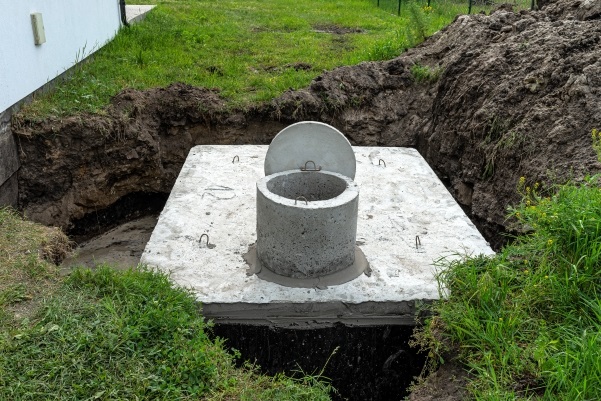
How to Protect Your Spectic System during Hurricane Season
August 11, 2025
Living along the coast of North Carolina means enjoying beautiful views and ocean breezes—but it also means preparing for hurricane season. For homeowners with septic systems, that preparation is especially important.
Heavy rain, storm surge, flooding, and power outages can overwhelm or even damage your system. Add in sandy soil, a high water table, and saltwater intrusion, and you’ve got a recipe for potential trouble.
The upside? With a few proactive steps and some post-storm attention, you can reduce the risk of septic system failure and avoid expensive repairs. In this guide, we’ll cover how to get your system ready before the storm—and what to do once it’s passed—to keep things flowing smoothly, no matter the forecast.
Pre-Storm Septic System Preparation
Schedule a Pre-Season Inspection
Before hurricane season begins, schedule a comprehensive septic system inspection with Coastal Septic Solutions. A professional inspection can identify potential issues in your system that could become major problems during a storm.
During this inspection, your technician will check for:
-
Cracked or damaged tank components
-
Loose or compromised lids
-
Clogged effluent filters
-
Signs of drain field saturation
-
Proper riser installation and security
-
Structural integrity of all system components
Pump Your Tank if Needed
If your septic tank is due for pumping (or even close to being due), don't wait until after storm season. A full or nearly full tank could have limited capacity to handle the additional water that storms typically bring. Heavy rainfall and flooding can quickly overwhelm an already-loaded system, leading to sewage backups into your home.
Remember, in coastal NC, we generally recommend pumping every 3-5 years, but environmental factors like frequent storms may require more frequent service.
Secure Your System Components
High winds can turn loose septic components into dangerous projectiles. Walk your property and ensure that:
-
All septic tank lids and risers are properly secured
-
Any above-ground equipment is anchored or can be moved indoors
-
Electrical components (if you have a pump system) are properly protected
-
Landscaping around your system is trimmed and maintained
Document Your System
Take photos of your septic system components and their current condition. This documentation can be invaluable for insurance claims if your system is damaged. Make sure you know the exact location of your septic tank, distribution box, and drain field boundaries.
Stock Emergency Supplies
Prepare an emergency kit that includes:
-
Battery-powered flashlights
-
Emergency contact numbers (including Coastal Septic Solutions' 24/7 emergency line)
-
Basic tools for minor repairs
-
Disinfectant and cleaning supplies
-
Bottled water for essential needs
During the Storm: Protecting Your System
When a hurricane or major storm is actively impacting your area, your primary focus should be on safety. However, there are a few things you can do to minimize septic system damage:
Reduce water usage to absolute essentials. The less water entering your system during peak storm conditions, the better your system can handle the additional groundwater infiltration.
Avoid using your garbage disposal. Solid waste will only add unnecessary load to your already-stressed system.
Never attempt outdoor septic maintenance during a storm. Wait until conditions are completely safe before inspecting your system.
Post-Storm Damage Assessment
Once the storm has passed and it's safe to venture outside, conduct an assessment of your septic system. Look for these warning signs of potential damage:
Immediate Red Flags
Standing water or soggy areas around your septic tank or drain field that weren't there before the storm. While some temporary saturation is normal after heavy rainfall, persistent standing water indicates a problem.
Sewage odors emanating from your yard, especially near system components. This could indicate a damaged tank, broken pipes, or a compromised drain field.
Visible damage to risers, lids, or any above-ground components. Even minor cracks can allow debris and contaminants to enter your system.
Debris accumulation around system components. Sand, leaves, and other storm debris can clog filters and pipes.
Inside Your Home
Slow draining sinks, toilets, or showers may indicate pipe blockages or system backup.
Gurgling sounds from drains often signal air trapped in the system due to blockages or damage.
Sewage backup into your home is a serious emergency requiring immediate professional attention.
When to Call for Emergency Service
Don't wait to address septic problems after a storm. Contact Coastal Septic Solutions immediately if you notice:
-
Any sewage backup into your home
-
Strong sewage odors around your property
-
Standing water that doesn't recede within 24-48 hours
-
Visible damage to system components
-
Slow drains throughout your home
Remember, coastal North Carolina's environmental conditions can cause septic problems to escalate quickly. What seems like a minor issue today could become a major emergency tomorrow.
Long-Term Storm Recovery
Some septic system damage may not be immediately apparent. Schedule a post-storm professional inspection within a few weeks of any major weather event, even if you don't notice obvious problems. This proactive approach can identify developing issues before they become costly emergencies.
Consider upgrades that can make your system more storm-resistant, such as:
-
Installing secure risers if you don't already have them
-
Upgrading to more durable lid materials
-
Improving drainage around your system
-
Adding protective barriers around critical components
Your Hurricane Season Partner
Preparing for hurricane season doesn't have to be overwhelming. Coastal Septic Solutions is here to help you protect your investment and keep your family safe. From pre-season inspections to emergency repairs, we're equipped to handle all your septic needs throughout storm season and beyond.
Don't let the next storm catch you unprepared. Contact Coastal Septic Solutions today to schedule your pre-hurricane inspection and ensure your septic system is ready for whatever Mother Nature brings to coastal North Carolina.
Need emergency septic services? Call us 24/7 – we're here when you need us most.
Read More:
